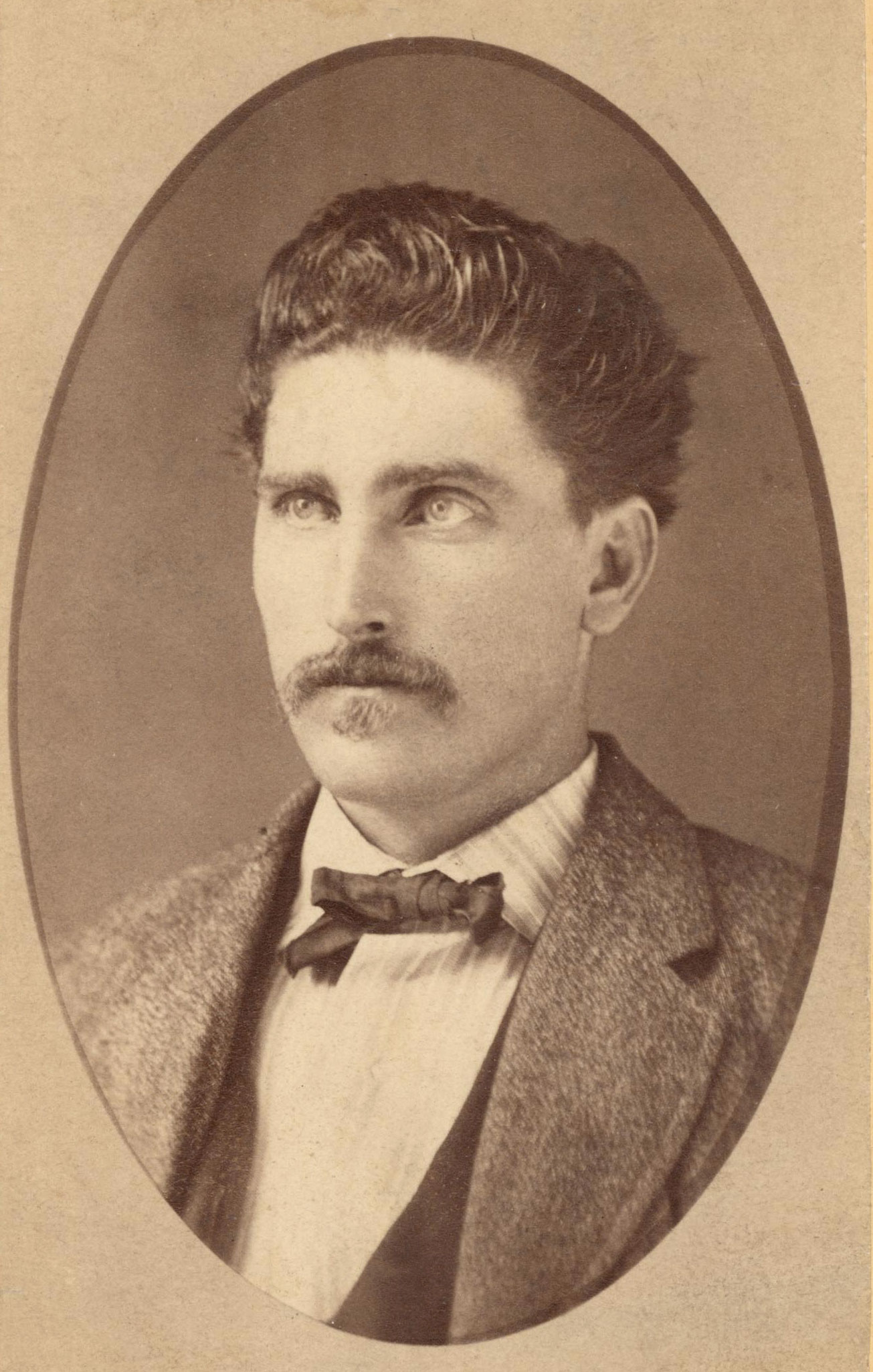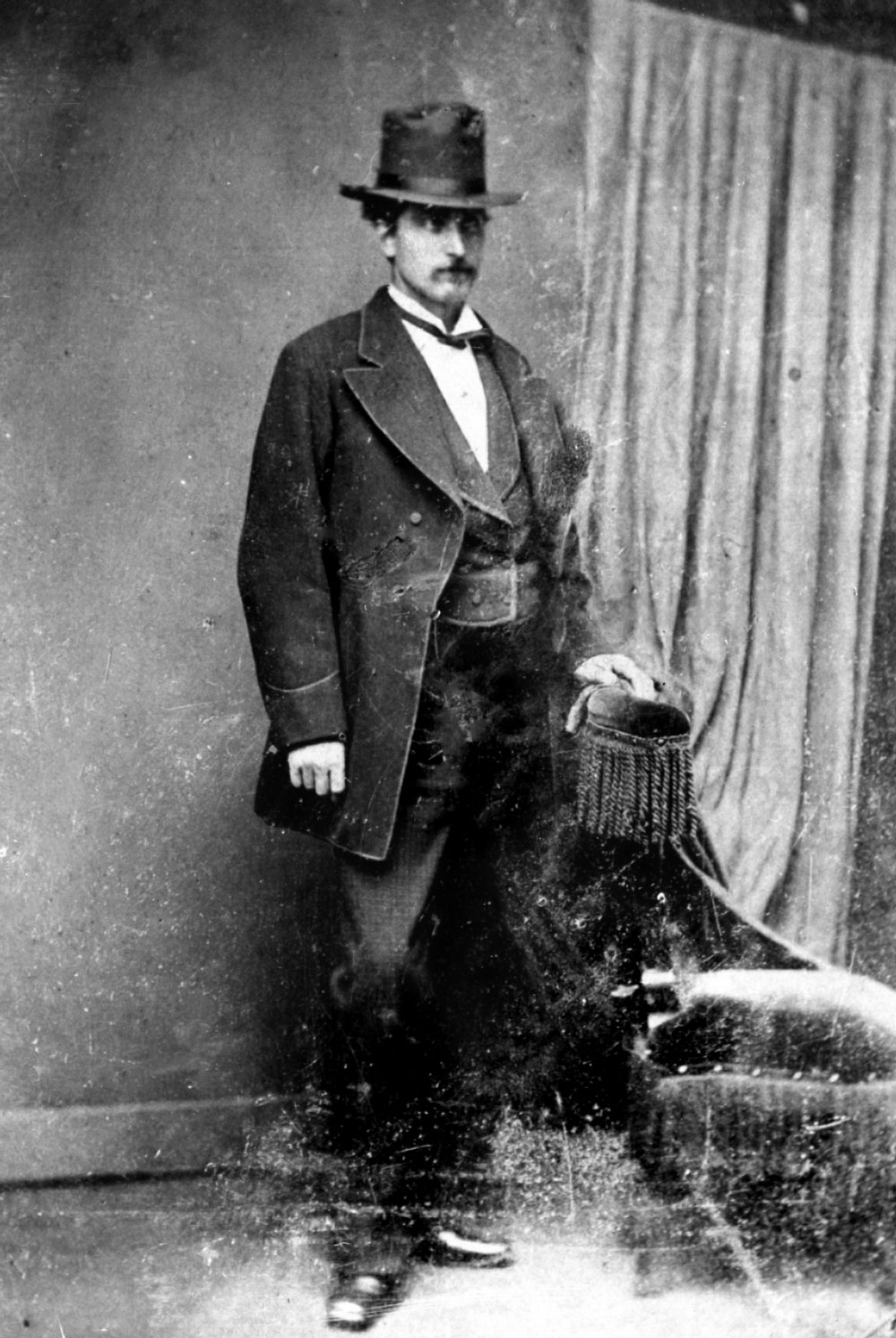The Encyclopedia of Oklahoma History and Culture
PAYNE, DAVID LEWIS (1836–1884).
The popularizer of the Oklahoma Boomer Movement, born at Fairmount Township, Grant County, Indiana, December 30, 1836, was David Lewis Payne, fifth son of William and Celia Payne. He was named for his famous cousin David Crockett, who had recently fallen at the Alamo.
A difficult man to characterize, Payne seemed a hero to his friends, but his detractors viewed him as an outlaw who pursued an unlawful scheme to obtain land that did not belong to him. He also defied many of the moral conventions of the day by accepting Rachel Anna Haines as his common-law wife. The couple produced an out-of-wedlock son, George, but Payne's followers did not seem to mind.
Considered a large man in his day, Payne stood six feet, two inches tall and weighed more than two hundred pounds. In youth he became fascinated with the West and went to seek his fortune, leaving home with his brother Jack in 1857 in hope of joining Col. Albert Sidney Johnston's army to put down the "Mormon War" in Utah. Arriving too late, Payne then traveled to Doniphan County, Kansas, and established a homestead, hunted wild game, and later scouted for the government, earning the nickname "the Cimarron Scout." He served in the Kansas legislature and later enlisted with the Nineteenth Kansas Volunteers, receiving a captain's commission. His first connection with Indian Territory came when the Nineteenth Kansas was sent to join with George Armstrong Custer during the Washita campaign in November 1868.
From Elias C. Boudinot Payne learned about the possibility of obtaining free land if the "Oklahoma" country was opened to settlement. While he and Payne were in Washington, D.C., in 1879, Boudinot, a Cherokee lawyer, advocated the opening of the Unassigned Lands. In August 1879 Payne joined the agitation, rented an office in Wichita, Kansas, and organized a group of settlers who hoped to persuade the government to open the land. Even after the first attempts led by John M. Bell and Charles C. Carpenter had failed, Payne expected to succeed in obtaining property for himself and his colonists. But the government held firm to the treaties and to Pres. Rutherford B. Hayes' policy of denying the boomers access to the Unassigned Lands. Like his predecessors, Payne and his followers made numerous intrusions into the forbidden area and were arrested each time by the army after they had staked their claims and set up town sites. Payne was personally responsible for either leading or asking others, such as his top lieutenant William L. Couch, to lead more than a dozen boomer raids from 1880 and until 1884.
The repeated intrusions wore thin the army's patience, tempers flared. The hapless troops were the instrument of a government unable to enforce sufficient legal sanctions against Payne and his followers. Payne's most ambitious intrusions occurred during the winter of 1883 and the summer of 1884. Departing in a terrible blizzard in early February 1883, the "Camp Alice" expedition failed like the others when soldiers appeared and arrested Payne and his colonists, who numbered in the hundreds. In summer 1884 the settlers invaded the Cherokee Outlet. Shocked and dismayed, Cherokee leaders called on the government to evict Payne and his group, who had laid out a town site on Cherokee land. After arresting and removing him from the Outlet, the army sent Payne on an arduous trip to Fort Smith to Judge Isaac C. Parker's court. There the boomer leader was indicted for introducing whisky into the Indian Territory. Payne posted bond as usual and departed to plan his next incursion.
Soon after, the boomer chieftain went on a speaking tour through the fall of 1884 to raise money for his colonization efforts. A generally unhealthy man, Payne was frequently ill. The people of Wellington, Kansas, asked him to give a speech on the evening of November 27, 1884. Many who heard the talk called it his best effort. The next morning he came downstairs to the De Barnard Hotel dining room and enjoyed his customary large breakfast. He began choking and swiftly succumbed to a heart attack. Death ended David Lewis Payne's leadership of the Boomer Movement on November 28, 1884, but the campaign for opening the Unassigned Lands continued under the leadership of William Couch.
See Also
CHARLES C. CARPENTER, SAMUEL CROCKER, INDIAN RESPONSE TO THE BOOMER MOVEMENT, LAND OPENINGS, OKLAHOMA TERRITORY, SETTLEMENT PATTERNS, UNASSIGNED LANDS
Learn More
Stan Hoig, David L. Payne, The Oklahoma Boomer (Oklahoma City: Western Heritage Books, 1980).
Gaston Litton, History of Oklahoma at the Golden Anniversary of Statehood (New York: Lewis Publishing Co., Inc., 1957).
Michael W. Lovegrove, "Free Homes: David L. Payne and the Oklahoma Boomer Movement, 1879–1884" (M.A. thesis, University of Oklahoma, 1996).
Carl Coke Rister, Land Hunger: David L. Payne and the Oklahoma Boomers (Norman: University of Oklahoma Press, 1942).
Citation
The following (as per The Chicago Manual of Style, 17th edition) is the preferred citation for articles:
Michael W. Lovegrove, “Payne, David Lewis,” The Encyclopedia of Oklahoma History and Culture, https://www.okhistory.org/publications/enc/entry?entry=PA028.
Published January 15, 2010
© Oklahoma Historical Society



